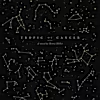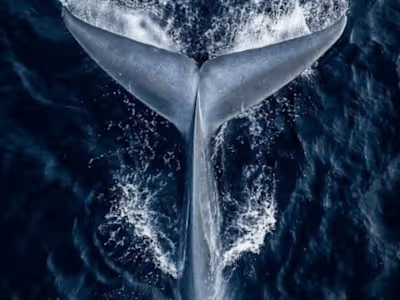On the Edge of Tomorrow
On the Edge of Tomorrow
by Leo Van Kirk (Laksh Balloo)
I
The sky was vast, dark and freezing.
And strangely interspersed with clearings, which at the end of the afternoon gave the agitated cloud an unreal aspect, an oneiric atmosphere.
At dusk, the sun lit up the coruscant ocean that lay before me. With the cold wind and the boiling clouds, the setting was interminable, grandiose, full of sadness.
Twenty years later, I still remember it. It was in August 1970.
What was so remarkable about that fiery August evening? While contemplating the spectacle of the season, I slept on a rock… But I was not dreaming.
In front of me, a green sea adorned with infinite deep blue, shrouded in the stigmata of the orange sun. My mind freed itself and let itself be carried away by the tumultuous waves to wither away serenely on the shore of life ... I am always in search of plenitude, zenitude, which can therefore better tell me, whisper it to me, than a beautiful landscape with sea scents?
The mystery — for it was indeed one — seemed to unfold on the horizon, in reality everything was happening within me. Through a painting of cosmic dimensions, the elements presented the terrestrial and celestial expanses around me. An August that looks like February.
My head was in the clouds.
Happy and icy, sharp and melancholy, dark and light, such appeared to me the waves of this increasingly red aerial ocean.
So much so that through those twilight flames of magnified density, my night vision continued to infinity. And my inner vision was also expanding to infinity. The palpable world had collided with poetry in a highly spiritual crash.
The sky was vast, icy, even darker. I no longer knew whether it was February or August, drowned in the mists of the indefinable, haunted by this enigmatic twilight that I will never forget.
The grandeur of the sea, the sky and the sand made me reverent. At one corner of the beach, a fire was lit. Like a butterfly in the night, I was fascinated by the light of the flame. The procreant power of the Fire which brought back from my memory the magic of my earliest childhood. The fire symbolised a precarious life which could be smothered at any time. Jet of flames, shower of sparks: interior fireworks of inclinations, appetites, joys, the creaking of the logs which burst: mystery of the inner bark which twists and cracks. The past too worn out, the chimerical future, and all things unexpectedly come to an end. Again, an ocean of dark, dense, haunting, terrifying darkness. It revelled in the empty space around me, my being compressed like this dying fire, prisoner of the whims of the breeze of this wintry night.
Under the halcyon sun of early August, the sea was an unremitting calm, dappled by a million shards of light - each one so infinitesimal yet, together, were intense in a way that was utterly exquisite. I lay in supine, feeling the harsh wood of the jetty under my light cotton clothing and dangled a hand into the ocean. The water was soothing, cool. I splashed for a moment and then squealed with surprise. Where moments ago there was just briny water, leapt the shiny grey head of a dolphin. From his ashen topside and whiter under belly, water droplets cascaded down, bejewelled in the light. His body arced and tail flipped.
I soon realized it was time to go home and my thunderous voice was tantamount to my apathy to set foot in that place.
II
The relationship between my parents, my sister and I had been phlegmatic, distant and hostile for as long as I can remember. For me, my mother was delirious, castigating and hurling hurtful invectives at the slightest infraction. “It doesn't matter,” my mother grumbled when I asked her where she moved my watercolor paintings, “it's not like you have any talent.” She always derided me for all my shortcomings with alacrity and I would watch her as she relayed my ignorance to my relatives with comical hilarity. And my sister took my mother's side against me every time. Five years my senior, Malagassa didn't seem to have a brain in her head. She dithered over everything, unable to make a firm decision. No matter how many times my mother deprecated her— “stupid, ugly, fat” - Malagassa made vain attempts to fawn her way back into my mother's good graces.
No matter how Stygian the storm was at home, I would always scuttle with the gaping eyes of a child, befuddled, shrouding the fear. However, at dinner, I had no other choice than to face my papa’s rage at the austerity of his life and my mama’s sulky withdrawal at the callousness of hers. She would serve the meal and he would always criticise. I ate in mock oblivion, erecting volcanoes out of my satini pomme de terre, anything to keep my eyes fixed on the plates and not their hating miens. The trick was to do everything right, be sweet, smile, otherwise the wrath they weren't nakedly showing each other found a new and smaller target.
There were nights nothing could stifle the yelling and, on those occasions, my mind would fill with escapade plans. When you're 13 years old and the most stable thing in your life was made of hessian fabric, there's a problem. Some say that when parents fight it's like tearing asunder the foundations of your child, but for me it was more than that. It crept into my psyche. Was this all there was in my world? Fear with nothing to ward it off but a poupette goni and a tattered molton to hide under?" But, at the end of the day, wasn't it that the life of a child? To be one denuded of power or choice, always going with the change in wind and praying for a safe haven?
In fact, the only sanctuary I had was the beach. The usual difé laplaz would crackle as I scrutinised at the clustered cinders of an evanescent fire up in the sky. If I were to call these stars beautiful, it wouldn't do it any justice. It was more than that. It was like staring into someone's eyes. And somewhere out there was my late grandpapa who would always spoil me. I couldn't help but feel like the last man standing.
The waves of vulnerability and anxiety that hit me had long trapped me in an intricate maelstrom. It would subtly be building up and gaining momentum while I recalled the string of hideous events. “Can't breathe!" my mind would gasp in panic as the receding waves dragged me into the sea of abysmal darkness. In my imagination, I would be flailing my arms around frantically, desperate for someone, something, or anything to cling on to. “Help, please..." my inner voice would plead as I sank deeper, tears threatening to spill. And as always, only cold silence greeted me.
My grandfather, Maclavou, always used to pontificate, “Our seas are the lungs of the world.” Oh how I miss my grandfather! When I was little, I loved for him to tell me stories about himself. No matter how tired he was, he never adumbrated them. He would fill with the minutest details, and they were always fascinating.
Another thing he did was tell me the stories with such grandiloquence! My favourite bedtime story was the one about his brief affair with the sea fairy, Varuna.
The story is etched in my mind:
“I still remember her from time to time, Varuna, the sea fairy. She had bulging eyes, chapped lips, sharp fingernails, and a heart as big as Buddha.
I gave her a look that spoke volumes about my lustful intentions for her.
The female apparition on the beach on that beautiful Sunday morning, beautiful as a witch, as intelligent as Brahma, winsomely dressed, filled me with enthusiasm.
With her elegance, she knew how to seduce me not only by her pulchritudinous esthetics, but also by her sepulchral poetry.
In her arms, I discovered the joy of being two and becoming one. Like the congruity of the carrion and the toad, the cockroach dance between the crab's legs, the song of death to the Moon in the night.
It was my first amorous rockery, my dearest neurotic fire, the only flame in my life. I was her most dreadful conquest, her glorious misery, her despicable darling. Together we formed an incendiary love.”
III
After a life of whirlpool busyness where time is seen as a commodity which must be parceled up and doled out with the same circumspection as cash, at 63, I decided to go back to my demulcent, lenitive niche. Like a breath of whiteness which maintains the floe in its eternal purity, the scents of the morning mixed with mists, the foam of the ocean under the firmament, it was exactly what I needed to win the war on my cancer.
Sitting since morning on a rock, I gaze into space. The placid gaze, the dull forehead, the speechless mouth, the silly expression. The sun acquiesces my consternation. With my torpid swings and inertia, I accompany every hollow word, every meaningless thought, every sterile movement of my old age.
The sight oozes of exquisite perdition. It echoes in the toxic air of the black tide which surrounds me in a dismal and deafening atmosphere. What used to galvanise and enthuse me is gone. What snailed and feasted on me like the tarragon that clumps to the top of starches has been replaced by darkness. The sea is no longer blue, the sand is gone, the sun is enveloped in a thick cloud of smoke. Through this smoke the sun shimmers, jaspering the ocean with ephemeral bronze puddles.
The ocean that was cerulean blue just yesterday, lapping the golden sands with the cold water of an early spring tide, is now blacker and murkier than the night sky. The surface moves in the slick way oil like a sheen rainbow that holds no beauty. No longer does the air smell of brine and washed up seaweed; it smells foul and the onshore breeze now carries toxic chemicals that made me wheeze. The birds flops helplessly on the black beach, coated in sticky crude and mostly blinded.
A few metres ahead, a dolphin is weaving his way through the waters he had known all his life, swimming with the family he loves so dearly. Today there is a new taste to the water, a pollutant for which they have no vocabulary- and so he will tell his loved ones that the water tastes like “bad." They already know but like him they can’t fathom why. Their eyes sting and there is no way to escape the toxins. They surface, breaking the top to feel cool air instead of the keen sting. The air is helpful but they can’t stay above the surface indefinitely.
While they are at the top, a tourist boat passes, children and adults alike point excitedly, snapping photographs they will treasure always. The sight of the dolphin pod brings the watchers a bliss they find hard to replicate in other ways and they stand mesmerized until the pod moves on. Back under the brine it is as pleasant as swimming in bleach and the babies are becoming distressed. All they can do is swim and pray that in time they will reach water that tastes like “good."
As I glance at that unrecognisable vista, I reminisce over what my grandpapa used to say:
“Every drop is inconsequential, nothing in the grandness of Point d’Esny. But when they all move together, as one body- therein lies the power. From the surface it may remain tranquil for many days, months even, but its strength is not gone, merely dormant. Below the surface, no matter how still, are unstoppable currents moving unimaginable volumes of briny water many thousands of kilometres. From above it seems no more alive than a bucket of water, yet below is more life than the skies above or the land it kisses."
The world where I used to come to find solace, my alcove, had moulded into an alien landscape. Rather than treating it with reverence, it was being used as a toilet bowl and dumping ground of human toxicity as we continue to pollute like children addicted to the sugar of commercialism.
As I gaze in abhorrence at the place I once cherished, I can’t help feel blue.
The sea is vast, dark and freezing.
Like this project
Posted Oct 22, 2023
A creative piece which sheds light on pollution from an oilspill from the Wakashio Crisis back in 2022.
Likes
0
Views
1
Tags




